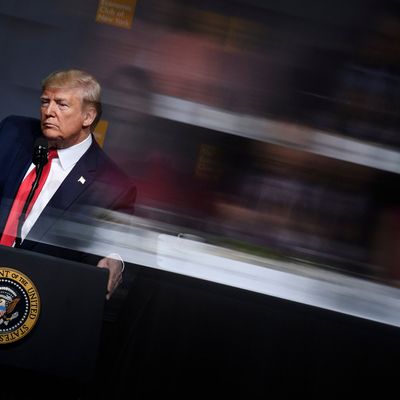
House Democrats are fighting in court to obtain grand jury testimony from Robert Mueller’s investigation. One reason they want the testimony, a lawyer for the House told a judge, is to determine, as part of its impeachment proceedings, whether President Trump lied to Robert Mueller.
Just because the House says it wants the material for possible counts of impeachment doesn’t mean Democrats will use it. Democrats have sought the grand jury material since before impeachment proceedings began, and impeachment gives the House a stronger legal basis to access the material. If they get it, there’s nothing obligating them to include it in the impeachment vote.
But there is plenty of evidence Trump lied to investigators. He did so indirectly, by suborning perjury, through his successful efforts to induce Michael Cohen to lie to Congress about Trump’s business dealings with Russia during the campaign.
Trump refused to to be interviewed by Mueller, but he provided written answers to questions. The recent Roger Stone trial revealed Trump provided misleading testimony when he claimed not to have any knowledge during the campaign of Roger Stone’s contact with WikiLeaks about stolen Democratic emails. “I do not recall discussing WikiLeaks with him,” Trump wrote. “Nor do I recall being aware of Mr. Stone having discussed WikiLeaks with individuals associated with my campaign.”
Notice Trump — or, to put it more accurately, Trump’s lawyers — couched his responses in the language of “do not recall,” no doubt to protect him from perjury charges. But claiming not to recall your own activities is hardly a foolproof defense against perjury — many witnesses claiming faulty memory have nonetheless been charged with perjury. House Democrats believe Paul Manafort’s testimony will provide even more evidence that Trump lied to Mueller.
Of course presidential perjury was the entire basis for the impeachment of Bill Clinton. A special prosecutor was hired to investigate a land deal in Arkansas involving the Clintons before they took office. Eventually, special prosecutor Ken Starr, unable to find any misconduct relating to the original charge, learned of an affair Clinton had with Monica Lewinsky, asked him about it under oath, and had a perjury case when he lied. Even though the lie was immaterial to either the original basis for the investigation or any official act as president, Republicans decided at the time the entire foundation of the rule of law required Clinton’s removal from office.
Lying about your cooperation with a foreign election attack seems more important than lying about your infidelity. But Kenneth Starr, once a figure of something close to worship among Republicans for his moralizing crusade to impeach Clinton, has defended Trump against many charges of misconduct, and no doubt will defend him against perjury charges, too.
Whether Trump perjured himself to Mueller — and whether such perjury deserves to be included as part of the grounds for impeachment — remains to be seen. What seems beyond dispute is that Trump failed to own up to his interest in obtaining and exploiting emails stolen by Russia, and evaded any public accountability for his behavior.






























